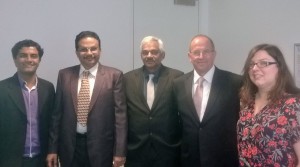Earlier this month, I had the pleasure of welcoming Maharashtra’s two senior police officials to London for a 3-day programme on exchanging best practices in intellectual property (IP) enforcement between the UK and India. Mr Sanjay Kumar IPS, Additional Director General of Police – Criminal Investigation Department (Pune), and Mr Dhananjay Kamalakar IPS, Joint Commissioner of Police – Economic Offences Wing (Mumbai) visited the UK from 04-06 August 2015. 
On day 1, we had meetings with internal and external stakeholders at the UK Intellectual Property Office in London. Colleagues from the enforcement directorate talked about civil and criminal remedies available for IP infringement in the UK – civil for patents, designs, trade marks, copyright while criminal for trade marks and copyright. This is equally true in India. On enforcement, the visiting officials were introduced to Trading Standards (TS) and Police Intellectual Property Crime Unit (PIPCU). TS, in partnership with local police, investigates and prosecutes IP crimes while PIPCU is, arguably, one of the most recent and successful enforcement models for protecting intellectual property rights in the UK. This police unit, started in September 2013, specifically focuses on online IP infringement. The importance of protecting the interests of innovators can hardly be overemphasised. This became evident when we met with representatives of UK based IP groups such as the anti-counterfeiting group, alliance for intellectual property, and federation against copyright theft.
On day 2, we travelled to Sussex to meet Mr. Giles York, Chief Constable of Sussex Police. He is the national police lead for the High Potential Development Scheme, Intellectual Property Crime and National Analysts. We had an engaging discussion on the common challenges faced by law enforcement officials in both countries as well as initiatives to tackle modern-day IP crimes, both online and on ground. What emerged from the dialogue between the cops of the two countries was a consensus on why IP crimes could have far-reaching and pernicious consequences. Proceeds from sale of counterfeit goods could support illegal activities such as smuggling and trafficking, public safety could be endangered from the use or consumption of fake products, and counterfeiting and piracy could be part of large organised crimes!
The UK’s National Crime Agency combats several threats under the wide umbrella of serious and organised crime; these include cyber crime, counterfeit currency, and intellectual property crime, among others. It was interesting to learn about the UK’s Proceeds of Crime Act 2002, which allows the police to recover proceeds from crimes, and deploy the gain towards organisational development. Such an incentive is a tremendous source of encouragement for the police force, which is continuously striving to keep crime rates under control. We all agreed that implementing initiatives to educate consumers on counterfeiting, encouraging partnerships between civil society and police for joint enforcement, and promoting public safety through awareness programmes could go a long way in thwarting the growth of IP infringement.
On the final day, we visited the UK Trade and Investment’s newly opened cyber demonstration centre, which houses state of the art facilities to showcase the UK’s cutting edge technologies in the cyber security sector. The centre is available for hire by UK companies interested in demonstrating their latest technologies in this exciting area.
As the visit drew to a close, we reflected upon the UK’s structure and practices in intellectual property enforcement. It became increasingly clear that a coordinated inter-departmental approach was inevitable to curtail the growth and prevent the occurrences of IP infractions. Such a strategy not only served the overarching goal of reducing the rate of IP crimes but also fortified the relationships amongst the various government departments – essentially, a joined-up approach is the key to success!
